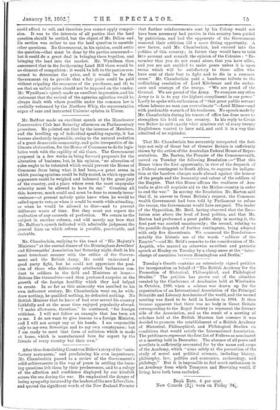After thus demolishing Count von Billow's story of the "
satis- factory assurances," and proclaiming his own impenitence, Mr. Chamberlain passed to a review of the Government's solid achievements in the way of peace in settling the burn- ing questions left them by their predecessors, and to a eulogy of the affection and confidence displayed by our kinsfolk across the sea during the war. He emphasised the danger of losing sympathy incurred by the leaders of the new Liberalism, and quoted the significant woids of the New Zealand Premier that further reinforcements sent by his Colony would not have been necessary- had parties in this country been guided by. patriotism, and had the opponents of the Government reserved their criticism till a snore fitting opportunity. A new factor, said Mr. Chamberlain, had entered into the politics of this country ; in future they would have to take into account and consult the opinion of the Colonies : " Re- member that you do not stand alone, that you have allies, and you are not entitled to make peace unless it is upon terms which will be satisfactory to those allies who have sent of their best to fight and to die in a common cause." Mr. Chamberlain paid a handsome tribute to the unflinching resolution of Lord Kitchener and the endur- ance and courage of the troops. "We are proud of the General. We are proud of the Army. To compare any other Army to it is to pay the highest compliment in our power?' Lastly be spoke with enthusiasm of "that great public servant whose labours no man can overestimate "—Lord Milner—and with pardonable warmth of his traducers. No speech made by Mr. Chamberlain during his tenure of office has done more to strengthen his hold on the country. In his reply to Count von Billow he said exactly what nineteen out of every twenty Englishmen wanted to have said, and said it in a way that admitted of no rejoinder.






































 Previous page
Previous page